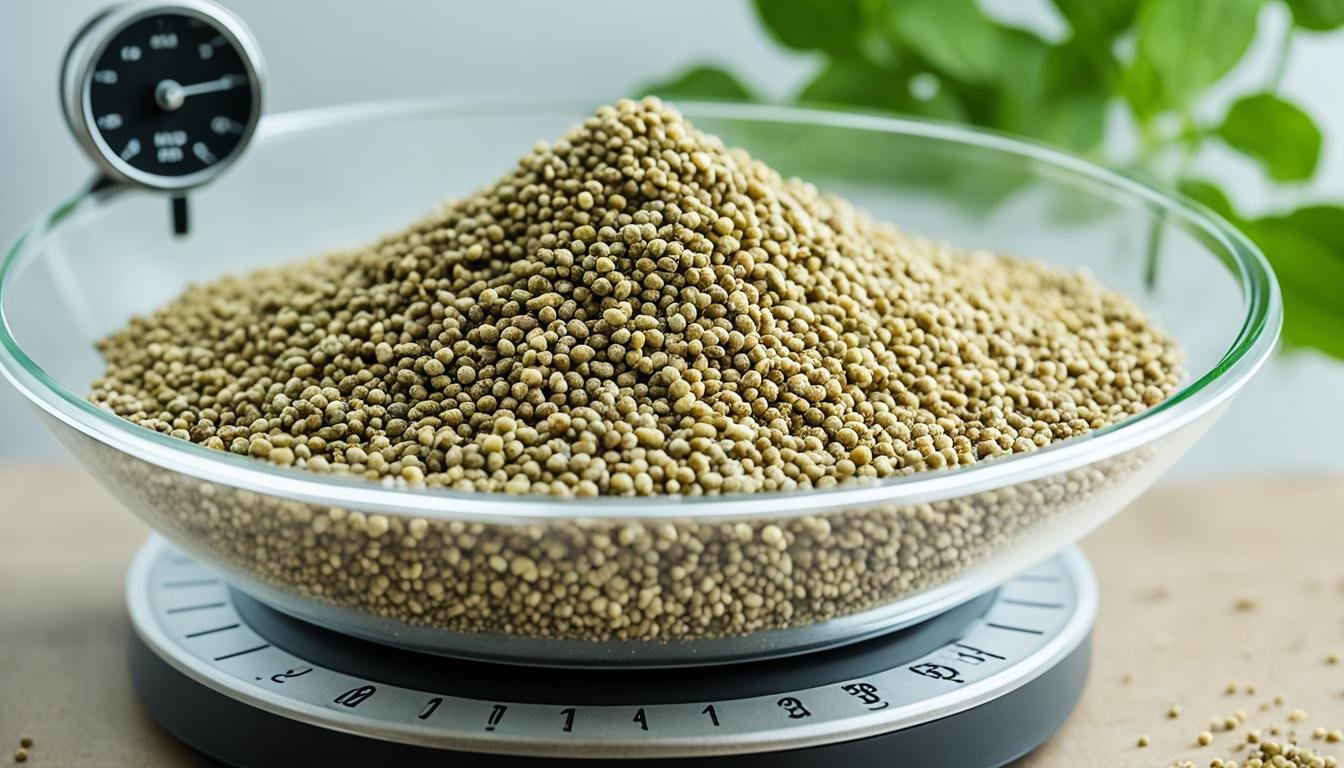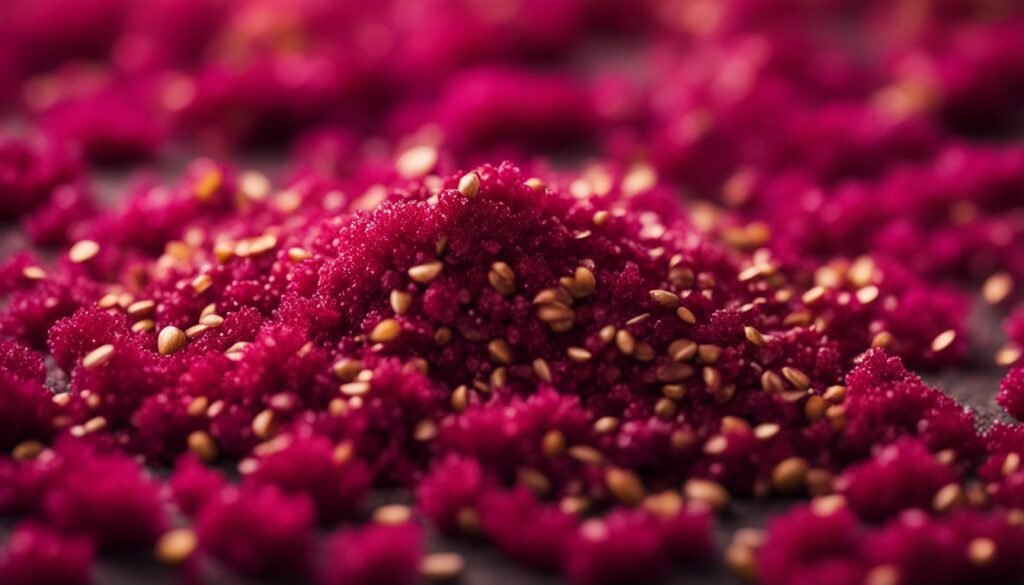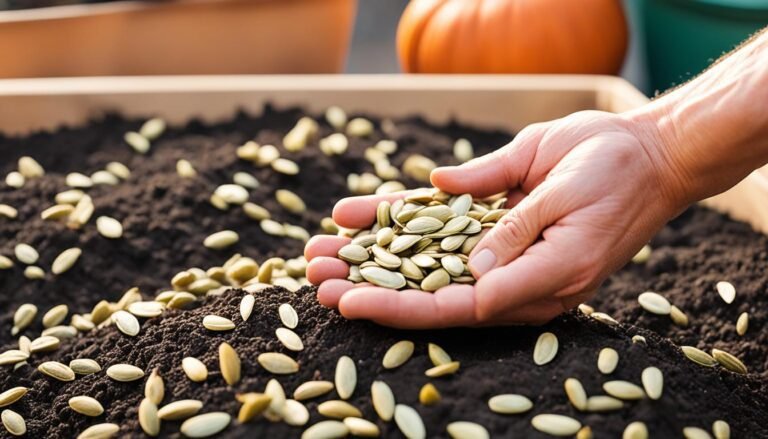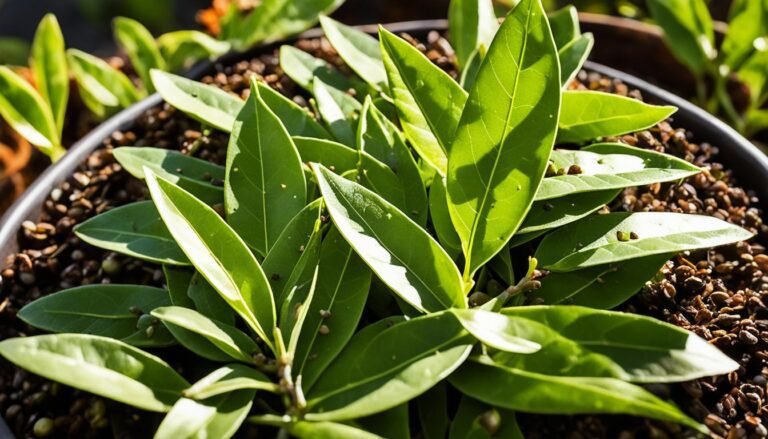amaranth seeds in weight management

Imagine a grain that makes you feel full and satisfied for hours. It also gives your body a lot of essential nutrients. This grain is amaranth, a superfood that can change how you lose weight. It has a lot of fiber, complete protein, and a low glycemic index.
We will look into how amaranth helps with weight management. We’ll see why it’s a game-changer for your health and wellness goals. Amaranth helps you feel full, keeps muscle mass, controls blood sugar, and may reduce inflammation. Join us as we explore the benefits of this nutritional powerhouse and how it can change your life.
Introduction: Unlocking the Secrets of Sustainable Weight Loss
Amaranth is coming back to the table, bringing with it a wealth of health benefits. Losing weight is more than just cutting calories; it’s about taking care of your body and finding a healthy balance with food.
The story of amaranth seeds in weight management is quite interesting. It’s filled with the benefits of amaranth’s nutritional value, its ability to suppress appetite and boost metabolism, and its gluten-free and antioxidant-rich qualities. Understanding how diet, lifestyle, and amaranth work together is key to lasting weight loss.
We’ll look at the basics of managing weight, focusing on how amaranth’s fiber, protein, and low glycemic index can help you reach your health goals. Join us on a journey where ancient wisdom meets modern nutrition.

Discover the amaranth advantage and start your path to better health. Let’s explore the secrets of lasting weight loss together, aiming for a future where you flourish.
Understanding the Core Components of Weight Management
Getting and keeping a healthy weight takes more than one thing. It’s about eating right, moving more, and changing your lifestyle for the better. These elements work together to help you lose weight and stay healthy.
Balanced Nutrition: A Cornerstone of Success
Starting with a diet full of important nutrients is key to managing your weight. You should eat a mix of whole foods like fruits, veggies, lean meats, and whole grains. It’s also important to eat less of the processed and sugary foods.
Knowing how many calories foods have and controlling how much you eat are crucial. This helps you keep your diet balanced.
The Power of Regular Physical Activity
Exercise is a big part of losing weight. It helps you burn more calories, speeds up your metabolism, and boosts your health. Doing different types of exercises like cardio, strength training, and stretching is best.
Being active not only burns calories but also helps build muscle. This increases your metabolism even more.
Lifestyle Modifications: The Missing Piece
Weight loss is more than just about diet and exercise. Healthy habits like managing stress, getting good sleep, and drinking enough water also matter. These habits work well with eating right and staying active to help you manage your weight.

Using these key parts of weight management can lead to lasting results and better health. Remember, focusing on both your body and lifestyle is the secret to keeping weight off for good.
The Amaranth Advantage: A Nutritional Powerhouse
Amaranth is a superfood that stands out for its amazing nutritional benefits. It’s an ancient grain that helps with weight management. It’s packed with health benefits.
High Fiber Content: Promoting Satiety and Reducing Calorie Intake
Amaranth is known for its high fiber. A cup of cooked amaranth has 5 grams of fiber. Most of it is insoluble fiber, which helps with digestion.
This fiber makes you feel full for a long time. It stops you from eating too much. It also helps with a diet that controls calories.
Complete Protein Source: Building and Preserving Lean Muscle Mass
Amaranth is a complete protein source. It has all nine essential amino acids. This is great for keeping and building lean muscle mass.
Lean muscle mass is key for a healthy metabolism. Amaranth gives you 9 grams of protein per cup. That’s more than quinoa.
Rich in Lysine: Supporting Calcium Absorption and Bone Health
Amaranth has a lot of the amino acid lysine. Lysine helps your body absorb calcium. It also helps keep your bones strong.
This grain is full of fiber, protein, and lysine. It’s great for managing weight. It helps you feel full, keeps muscle mass, and supports bone health. Amaranth can change your life by making you healthier and more balanced.

Role of Amaranth Seeds in Weight Management
Amaranth seeds are a powerful tool for managing weight in a healthy way. They are packed with nutrients that help people reach their health goals. This ancient superfood is known for its special nutritional benefits.
Lunasin Content: Potential Anti-Inflammatory and Anti-Cancer Benefits
Amaranth is known for its lunasin content. Lunasin is a peptide linked to anti-inflammatory and anti-cancer properties. Research is ongoing, but lunasin in amaranth shows its health benefits.
Low Glycemic Index: Sustained Energy Levels and Blood Sugar Management
Amaranth has a low glycemic index. This means it releases carbohydrates slowly, giving you steady energy. It helps manage weight by avoiding blood sugar spikes that can lead to overeating.
| Nutrient | Amount per Cup (Cooked) | Percent of Daily Value |
|---|---|---|
| Calories | 251 | – |
| Protein | 9.3 g | – |
| Carbohydrates | 46 g | – |
| Fiber | 5.2 g | 18% |
| Manganese | 2.0 mg | 105% |
| Magnesium | 160 mg | 40% |
| Phosphorus | 504 mg | 36% |
| Iron | 5.2 mg | 29% |
| Selenium | 8.4 μg | 19% |
| Copper | 0.4 mg | 18% |
Adding amaranth to your meals can help with weight management. It supports energy levels and keeps blood sugar stable.

Amaranth’s Versatility: Incorporating it into Your Diet
Amaranth is a versatile grain that can easily fit into your daily meals. It makes your meals wholesome and nutritious. From energizing breakfast bowls to satisfying salads, amaranth offers many culinary options.
Amaranth Breakfast Bowls: A Wholesome Start to the Day
Begin your day with a nourishing amaranth breakfast bowl. Mix cooked amaranth with fresh fruits like berries or bananas for sweetness. Add nuts or seeds for crunch, and a bit of honey or maple syrup for flavor. This breakfast is filling and energizing, helping you stay focused all morning.
Amaranth Salads: Nutrient-Packed and Satisfying
Boost your lunch with amaranth seeds. Combine them with fresh veggies, lean proteins, and a light dressing. Amaranth’s high fiber content keeps you full and satisfied. Its complete protein supports lean muscle growth.
Adding amaranth recipes to your meals is great for your health. Whether it’s a breakfast bowl or a lunch salad, amaranth is a valuable addition to a healthy diet.
Amaranth Flour: A Healthier Alternative for Baking
Starting a healthier lifestyle often begins in the kitchen. Swapping traditional flour for amaranth flour can make a big difference. This flour is packed with nutrients, making your baking healthier. It’s great for pancakes, muffins, and many other treats.
Amaranth flour doesn’t contain gluten, making it perfect for those with dietary restrictions. It’s also full of nutrients that can make your baked goods better.
- High in fiber, amaranth flour helps you feel full and can help with weight management.
- It’s a complete protein source, supporting muscle growth and maintenance.
- Rich in lysine, amaranth flour helps with calcium absorption and bone health.
Using amaranth flour in your baking lets you make delicious and healthy treats. You can make fluffy pancakes and moist muffins. It’s a great way to improve your favorite recipes.
Switching to amaranth flour might change how you bake, but it’s worth it. With some trial and error, you’ll find the right mix of amaranth flour and other ingredients. This ensures your baked goods taste great and have the right texture.
Choose amaranth flour to make your baking healthier and tastier. Your taste buds and health will appreciate it.
Protein-Packed Amaranth Bowls: A Balanced Meal Solution
Discover the power of amaranth for meals that help with weight management. Mix it with fresh veggies, lean proteins, and tasty sauces. This way, you can make amaranth bowls that are both nutritious and filling.
Customizing Your Amaranth Bowl for Optimal Nutrition
Amaranth meal ideas are super versatile. Start with cooked amaranth and add your favorite ingredients. Here are some tips to make your ideal amaranth protein bowls:
- Lean Protein Sources: Try grilled chicken, baked tofu, sautéed shrimp, or plant-based options like lentils or chickpeas.
- Colorful Vegetables: Add roasted sweet potatoes, sautéed spinach, steamed broccoli, or your favorite veggies.
- Healthy Fats: Use avocado slices, slivered almonds, or a drizzle of olive oil or tahini dressing.
- Flavor Boosters: Add fresh herbs, spices, garlic, or a tangy vinaigrette for extra taste.
By mixing amaranth with various ingredients, you get a meal that’s good for your weight and health. Try different flavors and ingredients to find what you like best.
| Nutrient | Amaranth | Quinoa | Oats | Brown Rice |
|---|---|---|---|---|
| Calories (per 100g) | 371 | 368 | 389 | 362 |
| Protein (g per 100g) | 14.45 | 14.12 | 16.89 | 7.94 |
| Total Fat (g per 100g) | 6.51 | 6.07 | 6.90 | 2.92 |
| Carbohydrates (g per 100g) | 65.25 | 64.16 | 66.27 | 76.17 |
| Fiber (g per 100g) | 6.7 | 7.0 | 10.6 | 3.4 |
| Magnesium (mg per 100g) | 248 | 197 | 177 | 143 |
| Iron (mg per 100g) | 7.61 | 4.57 | 4.72 | 1.47 |
| Calcium (mg per 100g) | 159 | 47 | 54 | 23 |
Amaranth is a nutritional superstar, packed with protein, minerals, and fiber. Use its versatility to make amaranth protein bowls that support your health and weight goals.
Amaranth’s Cultural Significance and Historical Roots
Amaranth, also known as Lalmath, has been important for centuries. It’s known for its great nutrition and many uses. It has deep roots in cultures across the world.
In India, amaranth is key during the Ganeshutsav festival. People use its leaves in cooking and the seeds in special dishes for Lord Ganesha. This tradition shows how amaranth is tied to India’s culture and spirituality.
In the Americas, amaranth was a main food for indigenous people for thousands of years. The Aztecs and Incas saw its value in religious rituals, food, and even money. The Aztecs called it the “food of the gods.”
Now, amaranth is still a big part of many cultures and foods worldwide. It’s set to be key in future healthy eating, offering lots of nutrition to everyone.
Amaranth is known for its deep cultural importance and great nutrition. It’s a crop that will continue to amaze and feed people for many years.
Cooking with Amaranth: Tips and Techniques
Amaranth is a nutritious and versatile grain. It’s great for breakfast or as a base for meals. Learning how to cook amaranth can open up new possibilities in your kitchen.
Boiling and Simmering Amaranth Grains
To cook amaranth grains, use one and a half cups of liquid for every half cup of dry amaranth. Bring it to a boil, then reduce the heat. Simmer for 20 to 25 minutes, stirring now and then, until the grains are soft.
The grains should absorb the liquid, leaving a thick porridge-like consistency. For a different texture, mix some amaranth with other grains like oats or rice. Cook them together as you would the main grain.
Popping Amaranth for a Crunchy Treat
Amaranth can also be popped for a crunchy snack. Heat a skillet over high heat and add a tablespoon of dry amaranth at a time. Stir constantly until the grains pop, like popcorn.
This popped amaranth is great on salads, soups, or as a breading for fish or chicken. It adds a fun texture to your meals.
With these easy cooking methods, you can add amaranth to your diet in many ways. This supports your health and wellness goals.
Amaranth’s Gluten-Free Nature: A Boon for Those with Dietary Restrictions
For people with celiac disease or other dietary needs, finding tasty and healthy ingredients is hard. Luckily, amaranth seeds are a great gluten-free option. They fit into many recipes without the gluten found in most grains.
Amaranth flour is a must-have for baking because it needs another flour to work well. This makes it perfect for those with amaranth gluten-free diets. Mixing it with other gluten-free flours lets you make tasty, healthy treats.
Amaranth is not just for baking. You can cook it as a grain, toss it in salads, or use it instead of rice. Its amaranth gluten-free status means it’s safe for those with celiac disease or gluten sensitivity.
If you’re looking to add more gluten-free options to your meals or want to try amaranth, this grain is a great choice. It’s packed with nutrients and easy to use for anyone with amaranth dietary restrictions. Enjoy the many ways you can use this amazing ingredient to make healthy, tasty meals.
Antioxidants in Amaranth: Supporting Overall Well-being
Amaranth’s bright red color shows it’s full of natural antioxidants. These include carotenoids and anthocyanins. They help fight off harmful free radicals and protect your body from damage. Adding amaranth to your meals can boost your health.
Research shows amaranth is packed with antioxidants and phenolics. These can help you stay healthy. Studies on different Amaranthus species show they can protect your body from oxidative damage.
Amaranth extracts are great for your liver health. They have hepatoprotective and antioxidant effects. Also, amaranth peptides during digestion have anti-inflammatory and antioxidant traits, helping your overall health.
Amaranth is more than just an antioxidant source. It’s full of vitamins, minerals, and fiber, making it great for a healthy diet. Adding amaranth to your meals can support your health and wellness.
Adding amaranth to your daily meals is easy and effective. You can have it for breakfast, in salads, or in baked goods. It’s versatile and can fit into your lifestyle. Start enjoying the benefits of this nutritional powerhouse for a healthier life.
Conclusion: Embracing Amaranth for a Healthier, Happier You
Getting to a healthy weight is about eating right, staying active, and changing your lifestyle. Amaranth is a great choice for your health goals. It’s full of fiber, protein, and special compounds like lunasin.
Adding amaranth seeds to your diet can help you manage your weight better. It’s packed with nutrients. Working with health experts or nutritionists can help you make a plan that fits you best.
Try different ways to use amaranth in your meals, like in breakfast bowls or salads. You can also bake with amaranth flour or make protein-rich bowls. Let the history and cultural importance of amaranth motivate you on your health journey.






